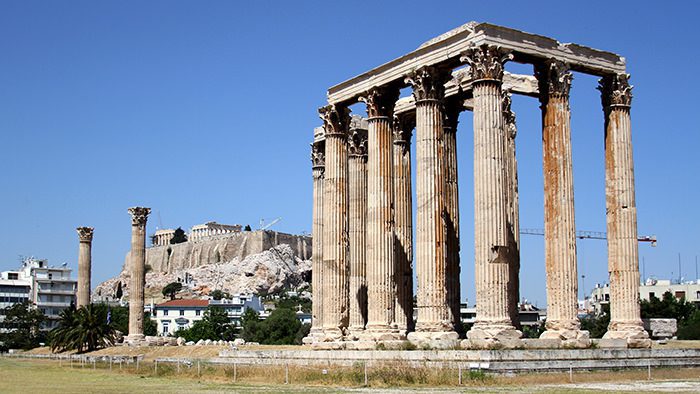
So you’ve made your way up to the Acropolis, toured the ancient agora and taken pictures of the Temple of Zeus. Now what do you do? It’s time to venture out of Athens to see some of the other ancient wonders in the area. Here are six of the best day trips from Athens with a link to a short video for each. All are ancient Greek sites and to the original capital of Greece.
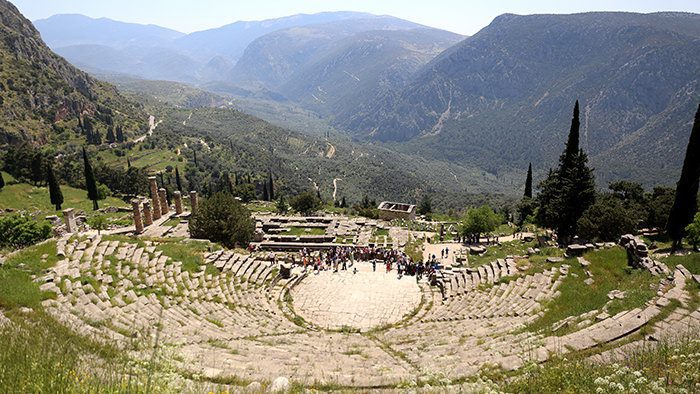
The Sanctuary at Delphi shines as one of the most spectacular wonders of ancient Greece; a place intricately tied to its history, culture, and mythology. For ancient Greeks, the Delphi was the literal center, or “navel,” of the universe.
Located amongst the foothills of Mount Parnassos, the Delphi is a sprawling pilgrimage complex where people came to worship, sacrifice, and receive their prophecies. For these reasons, the ruins of Delphi form a UNESCO World Heritage site.
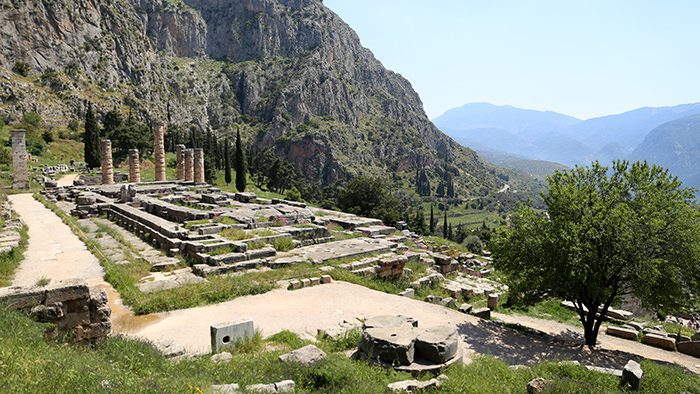
For centuries the Delphi was an important spiritual center of the ancient world. By the eighth century B.C., it had become a sanctuary dedicated to Apollo. The next two hundred years saw Delphi’s expansion with the help of funds given by wealthy Greeks for the construction of temples, votives, and statues.
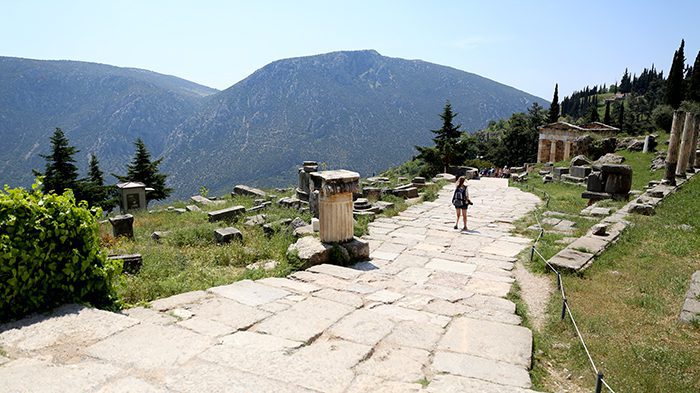
Greeks and foreigners from all over the continent came to Delphi to consult the main oracle, Pythia, before making important decisions or wanting to know the outcome of certain events. Pythia’s predictions were always considered accurate; messages from the gods themselves. Everyone from politicians, kings, and commoners would come to inquire about professional and personal issues. The oracle’s predictions were interpreted by priests, then delivered to the pilgrim, oftentimes in vague terms. If the prophecy was not correct, the priests were always to blame because the oracle was infallible.
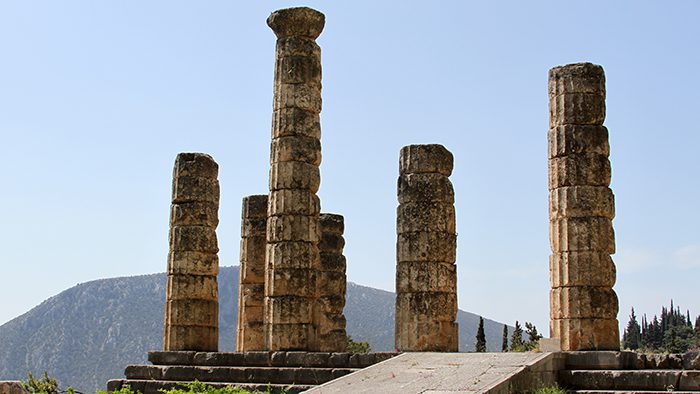
Nowadays, the Delphi complex contains the ruins of several important buildings as well as an excellent archaeological museum. Allow a full day to explore the archaeological site, the nearby Sanctuary of Athena (one mile east of the main site), and Delphi town. Combined entrance to the site and museum is €9. The site is open daily.
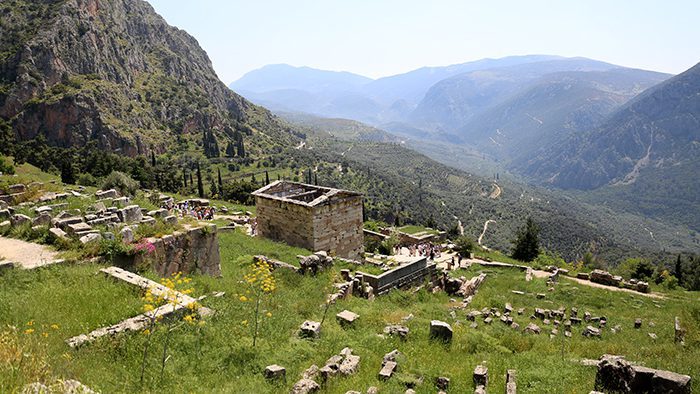
Renting a car is an inexpensive option and will allow you the most freedom, especially if you would like to spend the night in the cool mountain climate. It takes a little over two hours to get from Athens to Delphi by car. Many visitors opt for an organized bus tour, but we think that the visits are a bit rushed. You could also take a KTEL bus from the Liosson Street station (Terminal B) in Athens. The first bus to Delphi departs at 7:30 a.m., but be there at least an hour beforehand if you are traveling in high season. Sit on the right side of the bus to get the best views. The return buses depart Delphi all afternoon, with the last bus leaving at 6:30 p.m.

Where to eat: Exploring the ruins will surely work up an appetite in you. If you don’t feel like shelling out for an overpriced sandwich at the museum café, down the road is Delphi Town. Epikouros Restaurant (46 Pavlou – Friderikis Street) is a family-owned taverna that offers homemade dishes at affordable prices. In addition to the daily specials, try the salad with local cheese, pine nuts and pomegranate seeds, as well as the lamb and potato stew.
Tip: The archaeological site opens at 7:30 a.m. and the museum opens at 9 a.m. During the summer months, come as early as possible to explore the ruins in comfort. The midday heat here can be brutal.
Click here to see our episode on the Dephi

One of the easiest side trips from Athens is to the Temple of Poseidon in Cape Sounion. The one-hour coastal drive is easy and straightforward. The temple, which dates back to the fifth century B.C., sits at the top of a hill overlooking the Saronic Gulf. The archaeological site, which is known simply as Sounion or Sounio, was the site of two ancient sanctuaries – one to Poseidon and the other to Athena. The Temple of Poseidon is larger and in much better condition than its counterpart. Built in the Doric style, it had 36 columns of which 18 still stand.
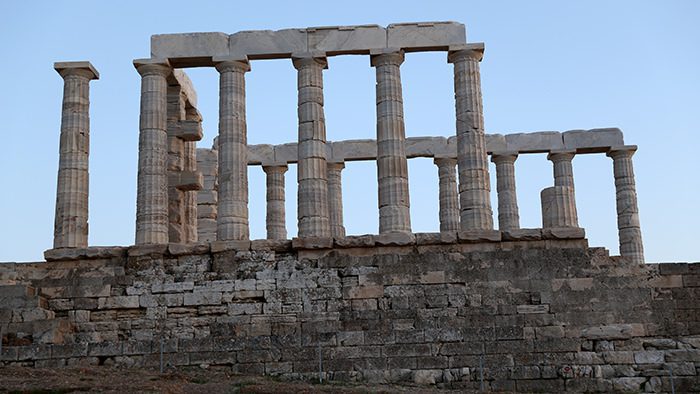
Cape Sounion is steeped in Greek mythology. Legend has it that Sounion was where King Aegeus leaped to his death upon seeing his son Theseus’s ship return home with a black sail. Theseus was to go slay the Minotaur in Crete and if he failed, his ship would return with a black sail. If he succeeded, it was to return with a white sail. Theseus managed to defeat the Minotaur but forgot to use the white sail. His father saw the ship return home with the wrong sail and committed suicide off the cliffs of Sounion. This is how the Aegean Sea got its name.
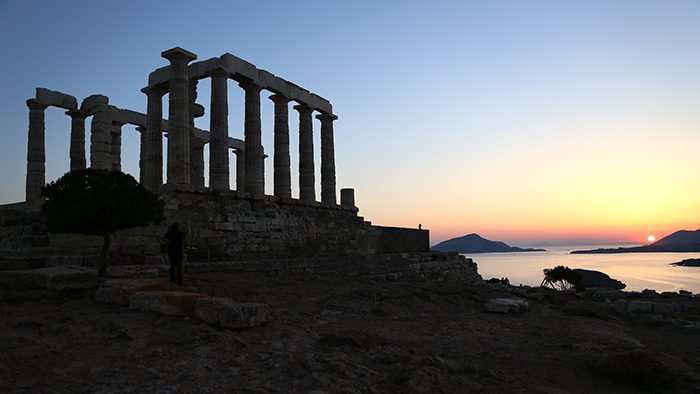
Each afternoon, dozens of people come to witness the dramatic sunset from the Temple of Poseidon. On a clear day, the views are stunning. It is best to get here at least an hour before sunset to get yourself a good spot. Entrance to Sounion is €4. The best ways to get there is to drive (give yourself an extra 45 minutes to contest with Athens traffic) or book an organized Cape Sounion Sunset Tour. We suggest renting a car and going on your own so that you’ll be able to dine at one of the local seafood tavernas after watching the sunset. Wherever restaurant you choose, be sure to ask if red mullet is in season – they’re fried whole and delicious
Click here to watch Cape Sounion sunset video

By the fifth century B.C., ancient Corinth (Korinthos) was a major city-state with a highly prized geographical location. At one point it was five times larger than Athens and had two of the ancient world’s busiest ports only four miles apart. Its prime location at the narrow isthmus connecting mainland Greece to Peloponnesus also brought unwanted attention, making Corinth susceptible to attacks from Persians, Athenians, and Romans.
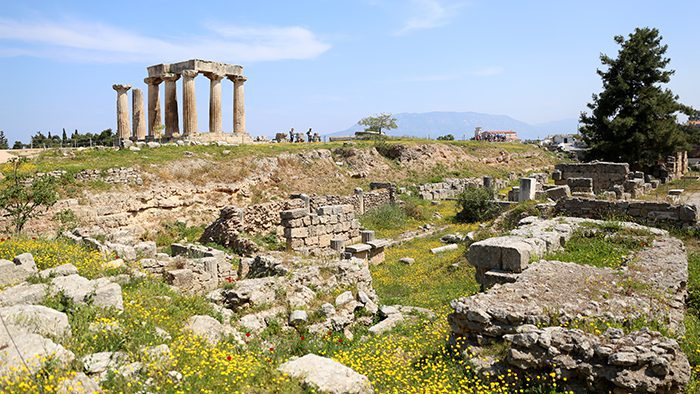
By the first century A.D., Corinth was overtaken by the Roman Empire and converted into a major commercial colony by Julius Caesar. Roman Corinth flourished under its new emperor, and the city inhabitants grew to nearly one million. By the time Paul the Apostle arrived in the first century A.D., Corinth was booming. St. Paul stayed for 18 months (Acts 18:1-18). During this time he wrote letters to the Corinthians, which can be found in the New Testament.
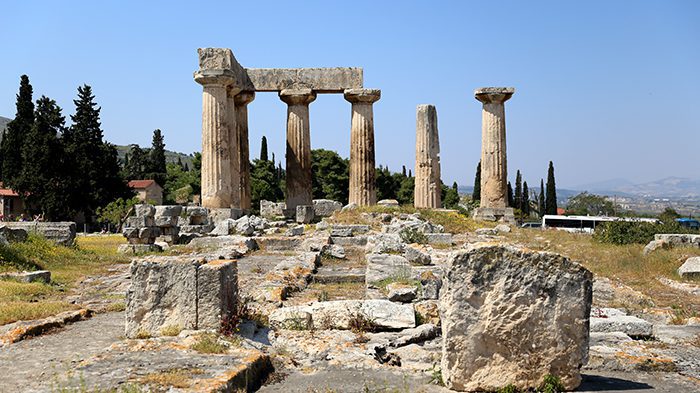
For history buffs, exploring the ruins of Ancient Corinth makes a great day trip from Athens. The archaeological site contains the ruins of Archaic structures and Roman buildings. Next door, the Isthmia Museum has a rich collection of objects found during excavations: Corinthian tiles, wooden doors, colored glass fragments, weapons, and carved marbles. Behind the city is what is left of the fortified medieval acropolis.
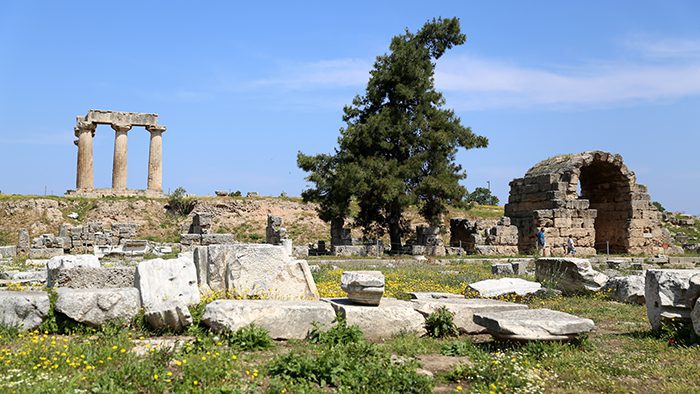
Ancient Corinth is open daily from 8 a.m. to 7:30 p.m. during summer and 8 a.m. to 3 p.m. during winter. Admission is €6 and includes entrance to the museum. It takes approximately one hour to make the 90-kilometer drive by car. KTEL buses are available from the KTEL Kifission bus station in Athens, but they will only take you to the new town. From there, you will need to take a taxi or another bus to the archaeological site.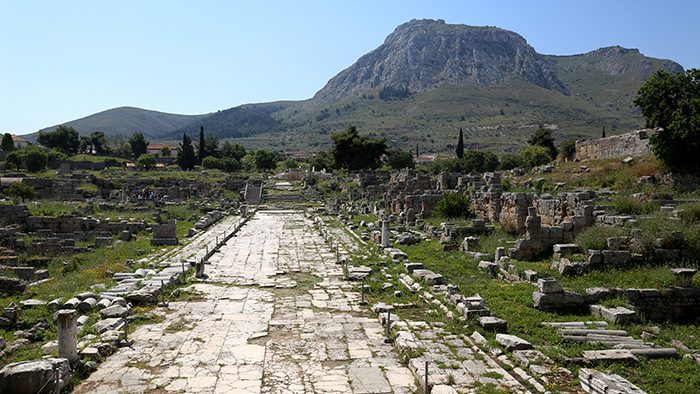
Tip: if you are visiting in the summer months, try to come early in the morning to avoid the afternoon heat, as the site doesn’t offer much shade.
Click here to tour Ancient Corinth
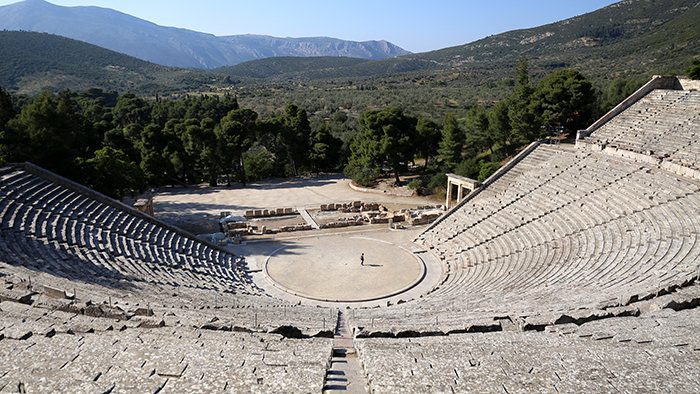
Near the unassuming fishing town of Archaia Epidavros, on the eastern coast of Peloponnesus, stands one of the most impressive civic monuments of the ancient world, the Epidavros Theater. In ancient times, the area was an important spiritual center for the Greeks, and later the Romans. Nowadays it is a UNESCO World Heritage Site and popular day trip from Athens.
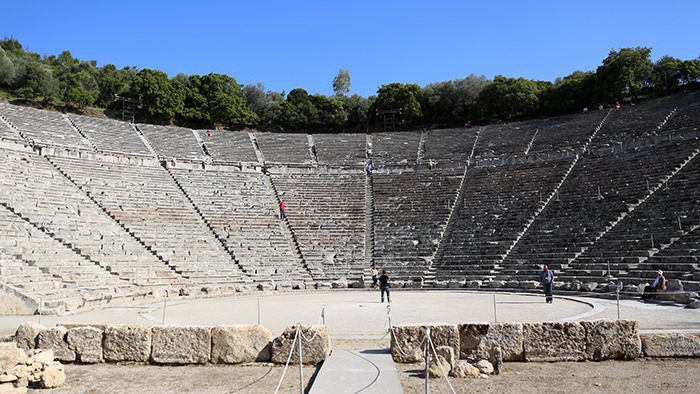
During the fourth and third centuries B.C., Epidavros developed into a sanctuary and healing center dedicated to the Greek healing god, Asklepius. The area’s natural springs and mild climate were thought to be therapeutic. People came from all over Greece to seek cures for their ailments. Proceeds from patients and affluent donors helped fund a large-scale building project that included several temples, bathhouses, a gymnasium, and sleeping quarters. As a whole, the archaeological site is quite impressive, but the real highlight is the striking Epidavros Theater.
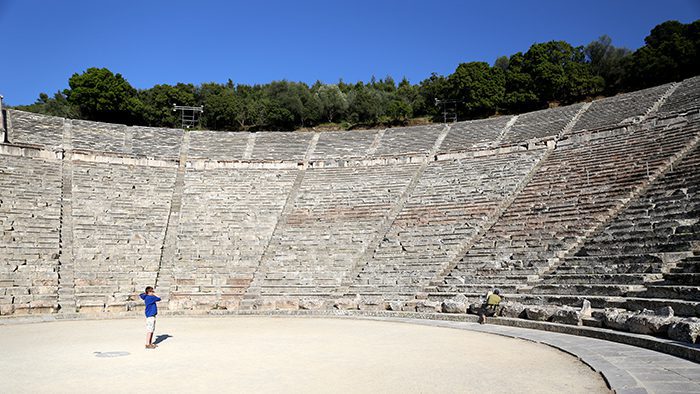
The Epidavros Theater dates back to the fifth century B.C. It the capacity to hold over 14,000 spectators and is one of the largest classical theaters every built. Its acoustics are superb, and it is still used for live plays and concerts during the summer.
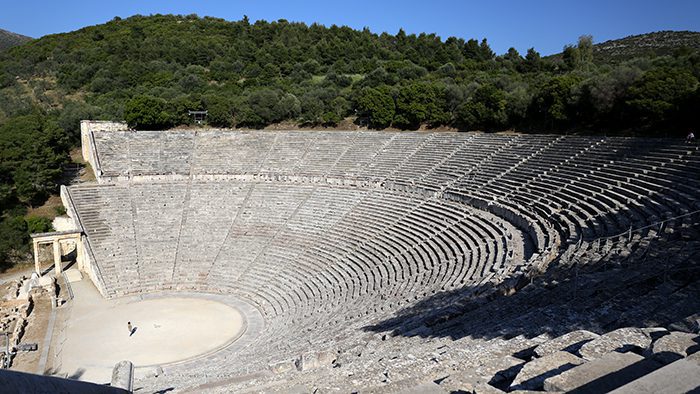
The Epidavros site is open daily from 8 a.m. to 8 p.m. A €6 admission ticket will grant you access to both the site and museum. It takes approximately two hours to reach Epidavros by car. There are daily buses to Epidavros departing from Kifission KTEL station in Athens.
Click here to watch Epidavros Theater video
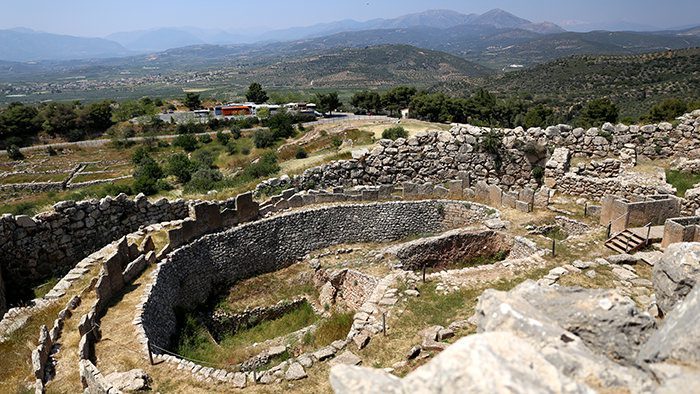
Ancient Mycenae existed in the late Bronze Age and pre-dates Delphi by almost 800 years. This UNESCO World Heritage site sits a 1.5-hour drive from Athens, overlooks the beautiful valley of Argos. Its proximity to Nafplion makes it easy to visit both places in a single day trip.
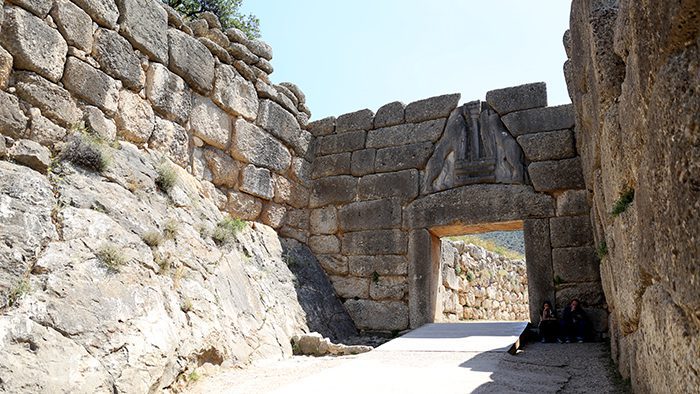
Between the 16th and 12th centuries B.C., Mycenaeans controlled much of the road and waterways linking Peloponnesus and northern Greece. They were known to be skilled warriors and had become prosperous through trade with outside kingdoms and other Greek city-states. Mycenaean pottery has been found as far as Egypt. The Mycenaean civilization had a considerable influence over ancient Mediterranean culture, prompting a historical era to be called the Mycenaean Period (1600 – 1100 B.C.)
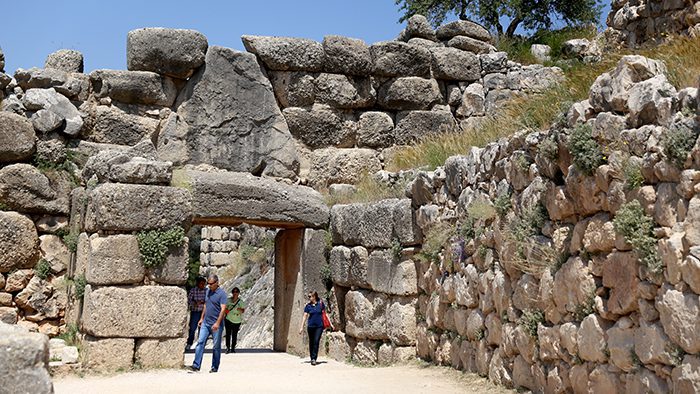
The ruins of Ancient Mycenae are significant for several reasons. It is here that the mythical King Agamemnon, leader of the Greeks in the Trojan War, was believed to be from. The site has several interesting features including grave circles, tombs, a royal palace complex, and the striking Lion Gate. The gate, which depicts two lions standing on an altar, was the main entrance to citadel of Mycenae. Along with the lion heads, much of Mycanae’s treasures have been plundered throughout the centuries. The artifacts that did survive are now displayed in the onsite museum, however the showpiece of the collection, the original golden funerary mask found in the treasury of Mycanae, is held at the National Archaeological Museum in Athens. A copy of it can be seen at the Mycenae museum.
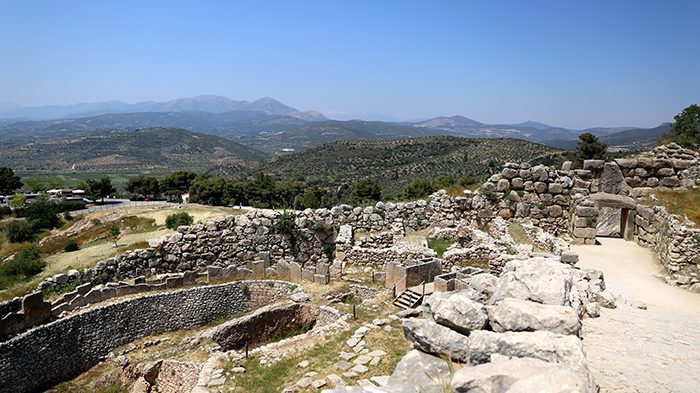
Ancient Mycenae and its museum are open daily. Admission is €3. Driving to Mycenae from Athens is straightforward and simple. If you prefer not to drive, there are daily buses from Athens to Mycenae that depart from the Kifission KTEL station.
Click here for our video on Ancient Mycenaea
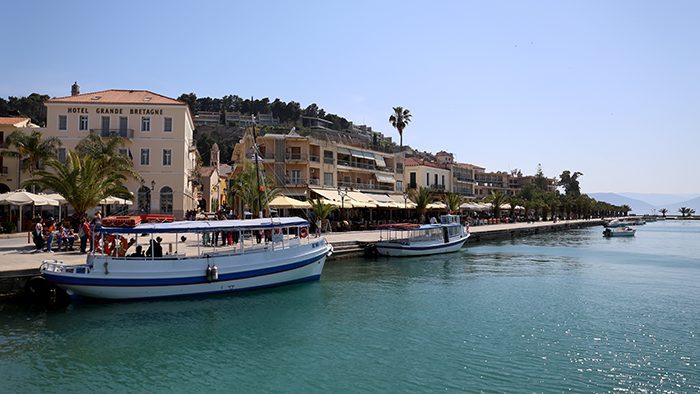
Nafplion is just a half-hour drive south of Mycenae, which makes them easy to combine into one day trip. The city of Nafplion is regarded as one of the most beautiful in Peloponnesus. Ancient ruins, Byzantine walls, Ottoman mansions, Venetian defenses, and neoclassical houses give Nafplion’s old town a unique character.
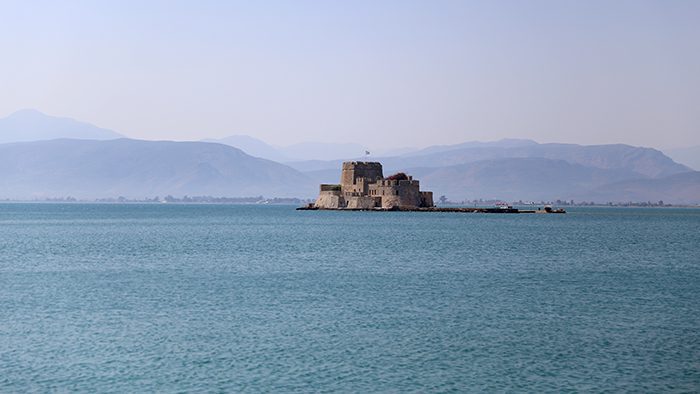
Nafplion served as the first capital of independent Greece from 1823 to 1834. A stroll around Nafplion will reveal beautiful sea views and charming architecture. While walking around the old town, you will come across Syntagma Square and several handicraft shops, restaurants, and cafés. There is also a small harbor overlooking the Bourtzi fortress. The fort, which was built by the Venetians and later strengthened by the Ottomans, is accessible by boat from the old town harbor.
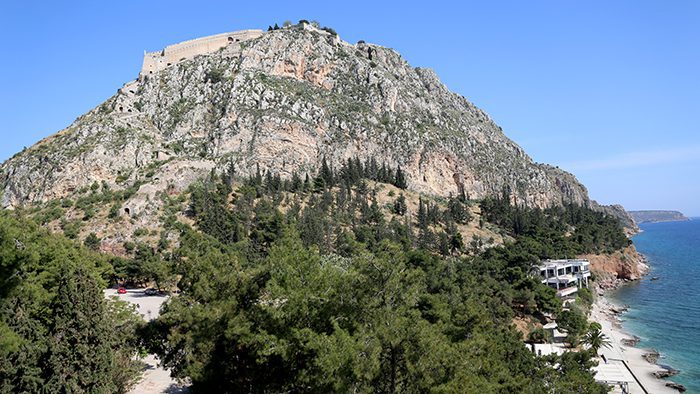
Perhaps the most striking feature of Nafplion is the 18th century Palamidi fortress dominating the hill above the old town. The fortress has eight bastions, a small chapel dedicated to Saint Andrew, and old prison cells dating back to the 19th century. Palamidi fortress offers beautiful ocean views and is accessible by car or by foot. If you decide to walk, you will need to climb the 999 stairs to the top!

Where to eat: Nafplion’s main seaside promenade is lined with fish tavernas and coffee shops, of these we recommend Savouras (79 Bouboulinas Street) for its fresh fish and generous portion. Savouras actually means rubbish, but this place is anything but. Grab a table out on the terrace and sample some of the house specialties: shrimp saganaki, fried calamari, grilled octopus, or lobster linguini (enough for two). If you’re in the mood for something other than seafood, Kakanarakis 1986 (18 B. Olgas Street) has a well-rounded menu of taverna-style meats, pastas, salads, and fish. Specials change daily to incorporate seasonal foods and portions are generous. Though the restaurant does not have a water view, it makes up for it with attentive service and affordability.
Have you been to Athens or planning on going? Tell us your opinion about these best day trips from Athens. Leave us a comment below!
Special thanks to This is Athens. All opinions are our own.
Counter
101 Countries • 1432 Cities
Susan says:
Love your article! Gave me loads of ideas for my upcoming holiday in early November 2016! Thanks! Understand that the Delphi site closes at 3pm in nov. do you think it will be too rushed as a day trip from Athens?
David says:
Hi Susan,
Thank you for writing me. If you’re taking a tour I think you will be fine as they usually leave really early (7am) from Athens. You would explore the site for 2-3 hours and then have lunch before heading back.
Here is a tour I recommend: https://www.getyourguide.com/athens-l91/delphi-day-trip-from-athens-t691/
Here are some more options: https://www.getyourguide.com/s?q=delphi
If you will be in Athens then I highly recommend heading to the Temple of Poseidon for sunset. Here is a link to the tour: https://www.getyourguide.com/cape-sounion-l120/cape-sounion-and-temple-of-poseidon-tour-from-athens-t698/
Here is our Athens guide: https://davidsbeenhere.com/2016/09/09/top-things-see-athens/
Let me know if you have any further questions about Athens or Greece in general.
Best,
David
Laura (thexenophilelife) says:
Great article! Planning a trip to Greece this fall and we will probably be doing Delphi, Corinth & Nafplion as day trips, as well as a quick trip to the island of Aegina. 🙂
David says:
Sounds amazing! Thanks for stopping by.